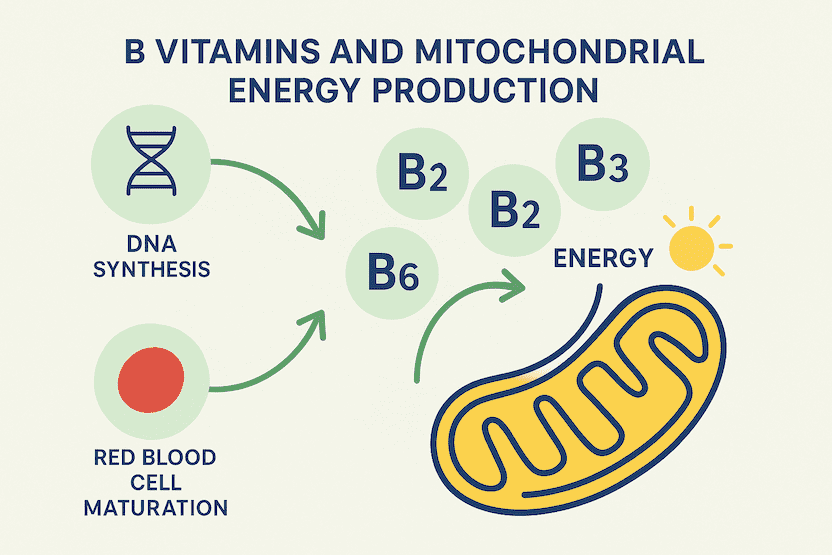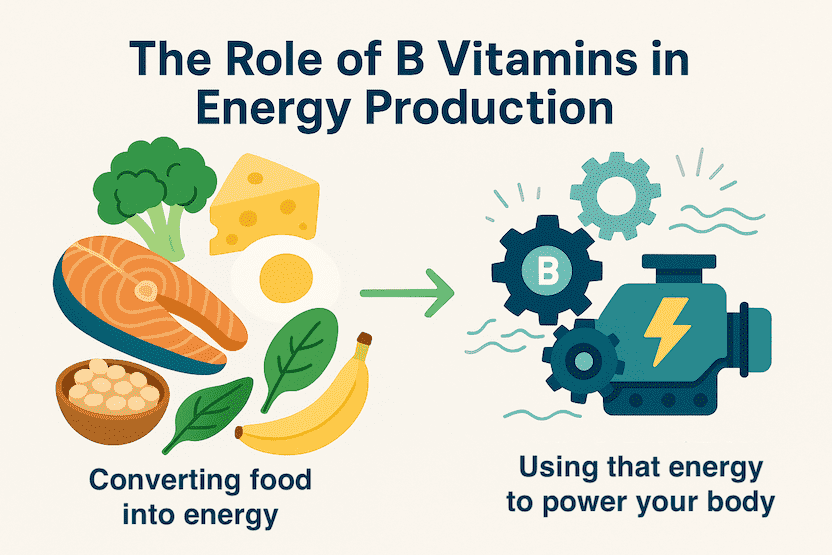Last update: November 6, 2025
5 minute read
B Vitamin Deficiency: Is It the Hidden Culprit Behind Your Low Energy Levels?
Feeling drained? A hidden B vitamin deficiency, especially B12, could be behind your low energy. Learn symptoms, risks, and how to restore vitality.

By Derick Rodriguez, Associate Editor
Edited by Dr. Dimitar Marinov, MD, RDN, PhD

Low energy dragging you down? The answer might lie in an often-overlooked source: B vitamins.
These essential nutrients play a crucial role in converting food into energy, supporting everything from cellular function to mental clarity. When you're deficient, it can feel like your body's engine is sputtering.
Key takeaways
- B vitamins function as coenzymes helping in the conversion of food into energy, crucial for metabolic functions
- Deficiency symptoms include low energy, brain fog, and poor recovery; labs can confirm the status
- Vegan diets and certain medical conditions increase the risk of deficiency; pay closer attention to fortified foods or supplements
Understanding B vitamins and energy
B vitamins function as coenzymes that help your body convert carbs, fats, and proteins into usable energy. They also maintain red blood cells and support your nervous system.
Key point: B vitamins don't give energy like coffee does; they enable energy creation. They're the wiring, not the caffeine.
Deficiency builds up for a while
Vitamin B12 is naturally found only in animal-derived foods and stored in the liver for years. When symptoms appear, the deficiency may have been developing for a while (approximately 3 years).
Why B12 absorption matters
B12 absorption depends on intrinsic factor (a glycoprotein made in the stomach) and uptake in the terminal ileum. Disruptions in this pathway, like pernicious anemia or gut disease, can cause deficiency even with adequate intake.

Higher-risk groups span dietary, age, and medical factors. Vegans and, more rarely, vegetarians face the greatest dietary risk since B12 occurs naturally only in animal products. Age becomes a factor after 60, when absorption naturally declines.
Medical conditions create absorption challenges—people with GI disorders like Crohn's or celiac disease, those who've had bariatric surgery, and individuals taking metformin or long-term acid suppressors all face increased deficiency risk.
Pernicious anemia is a form of B-12-deficiency anemia caused by loss of intrinsic factor, often due to autoimmune destruction of gastric parietal cells.
Recognizing deficiency signs
Common symptoms:
- Low energy and endurance
- Pale skin and lightheadedness
- Shortness of breath
- Numbness/tingling in hands or feet
- Mood changes and trouble focusing
Important: Symptoms overlap with many conditions, so lab testing is essential.
Useful lab tests
- Serum B12: <200 pg/mL low; 200–300 borderline
- MMA: Elevated (>0.40 μmol/L) suggests cellular B12 deficiency
- Homocysteine: Elevated in B12/folate/B6 insufficiency
- CBC/MCV: High MCV can indicate B12/folate deficiency
— Dr. Dimitar Marinov, MD, RDN, PhDIt is important to emphasize that fatigue and “low energy” have many possible causes, and supplementation should be based on confirmed laboratory findings rather than self-diagnosis. For most healthy individuals with a balanced diet, clinically significant deficiencies are uncommon, but for those on vegan diets, older adults, or people with gastrointestinal conditions, monitoring and targeted supplementation is valuable.
Root causes and risk factors
Dietary factors
- Strict vegan/plant-only diets lack natural B12
- High stress, alcohol overuse, and ultra-processed diets
- Inadequate fortified foods
Medical contributors
Even with good intake, absorption issues can cause deficiency:
- Autoimmune pernicious anemia
- Crohn's disease, celiac disease
- Gastric bypass surgery
- Long-term acid suppression medications
- Metformin use

Natural solutions
Food sources
Animal Sources | Plant Sources | Everyday Options |
|---|---|---|
Clams, salmon, sardines (high B12) | Fortified plant milks and cereals | Almonds (B2) |
Beef, eggs, yogurt (B12) | Fortified nutritional yeast | Potatoes, bananas (B6) |
Liver, leafy greens (folate) | Legumes, spinach, asparagus (folate) | Mushrooms (B5), eggs (biotin) |
Lifestyle optimization
- Sleep and stress management: Your nervous system needs predictability
- Gut health: Address digestive issues; absorption happens in the gut
- Medication review: Discuss B12 monitoring with your provider if on relevant medications
Smart supplementation
When to consider supplements
If you're in a higher-risk group or have a confirmed deficiency, quality matters:
Look for:
- Methylated forms (methylcobalamin, 5-MTHF, P-5-P)
- Third-party tested for purity
- No artificial colors or unnecessary fillers
- Evidence-based dosing
Practical tips
- Take with meals for better absorption
- Morning or midday timing works best
- Track energy levels over 2-4 weeks
- Work with your healthcare provider for monitoring

Creating your B-vitamin strategy
Creating an effective B-vitamin strategy follows a systematic approach. Start by honestly assessing your risk factors—consider your dietary patterns, age, and any medical conditions that might affect absorption.
If you're experiencing symptoms like persistent fatigue or brain fog, baseline lab testing becomes crucial for confirming a deficiency rather than guessing. Once you understand your status, build a foundation with B-rich foods appropriate for your dietary preferences.
Quality supplementation may be necessary if you're in a high-risk category or have a confirmed deficiency, but this should be targeted rather than random.
Finally, monitor your progress with follow-up labs to ensure your strategy is working and adjust as needed.
B vitamin deficiency, especially B12 and folate, can significantly impact energy, cognition, and overall well-being. The solution involves:
- Identifying risks
- Confirming with labs
- Optimizing diet
- Using targeted supplementation when needed
VitaRx Tip
If you're not deficient, extra B vitamins won't create more energy; they simply remove bottlenecks when you're low. Quality inputs plus consistency deliver results.
Frequently asked questions (FAQ)
Here are some of the most frequently asked questions about B vitamin deficiencies.
Final thoughts
A B vitamin deficiency can significantly affect your energy levels, cognition, and overall well-being. Identifying your risk factors, confirming them through testing, and addressing dietary gaps can help you reclaim your vitality.
Have you considered how your diet and lifestyle affect your B vitamin levels? Make it a priority to add foods rich in B vitamins or consider a quality supplement if needed. You deserve to feel your best.
Sources and references
Editor

Derick Rodriguez
Derick Rodriguez focuses on editing health and wellness-related content. With over half a decade of experience in the digital realm, Derick has developed a unique skill set that bridges the gap between complex health concepts and accessible, user-friendly communication. His approach is deeply rooted in leveraging personal experiences and insights to illuminate the nuances of health and wellness topics, making them more approachable and empowering readers with knowledge and confidence.
Fact checker

Dr. Dimitar Marinov
Dr. Marinov has years of experience in scientific research and preventive and clinical medicine. His publications in peer-reviewed journals are on nutritional status, physical activity, and musculoskeletal disorders among adolescents.
At VitaRx, we're not just passionate about our work — we take immense pride in it. Our dedicated team of writers diligently follows strict editorial standards, ensuring that every piece of content we publish is accurate, current, and highly valuable. We don't just strive for quality; we aim for excellence.
Related posts
While you're at it, here are some other relevant articles you might be interested in.

Get your personalized vitamin recommendations in less than
5 minutes.
Get your personalized vitamin recommendations in less than
5 minutes.






